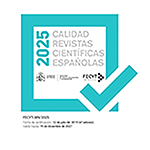Parliamentary Procedure as an Inventory of Disputes: A Comparison between Jeremy Bentham and Thomas Erskine May
Resumen
Parliamentary politics is inherently procedural. The parliament debates and decides only questions that have been put on its agenda. Two famous tracts on the British parliamentary procedure, Jeremy Bentham’s Essay on Political Tactics and Thomas Erskine May’s A Treatise upon the Law, Privileges, Proceedings and Usage of Parliament provide an inventory of controversies for competent parliamentarians. Both tracts regard parliamentary procedure itself as controversial, and both discuss how to deal with the controversies in a fair manner. The tracts differ in style: Bentham, relying on his own parliamentary imagination, is able to identify possible items of dispute, whereas May’s interpretation of parliamentary procedure includes the history of parliamentary controversies. For both, playing with time is an inherent part of the Westminster procedure, based on a combination of spending and saving time, in linking the parliamentary itinerary of the motions to the parliamentary calendar. Both strongly defend the Parliament as an exemplary deliberative assembly. May, however, thematises the increase of agenda items and the increasing scarcity of parliamentary time as well as ways of preventing parliamentary paralysis due to obstruction. This leads May to revise the fair play principle to include the fair distribution of parliamentary time.Descargas
Descarga artículo
Licencia
La revista Res Publica. Revista de Historia de las Ideas Políticas, para fomentar el intercambio global del conocimiento, facilita el acceso sin restricciones a sus contenidos desde el momento de su publicación en la presente edición electrónica, y por eso es una revista de acceso abierto. Los originales publicados en esta revista son propiedad de la Universidad Complutense de Madrid y es obligatorio citar su procedencia en cualquier reproducción total o parcial. Todos los contenidos se distribuyen bajo una licencia de uso y distribución Creative Commons Reconocimiento 4.0 (CC BY 4.0). Esta circunstancia ha de hacerse constar expresamente de esta forma cuando sea necesario. Puede consultar la versión informativa y el texto legal de la licencia.









